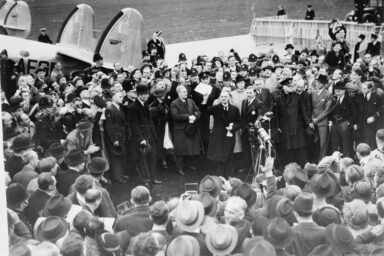Addressing Congress on Wednesday, Netanyahu singled out Iran as a major threat. Kamala Harris called for a ceasefire in Gaza, adding that she would not forget about Palestinians.
|
Listen To This Story
|
Embattled Israeli Prime Minister Benjamin Netanyahu’s hour-long speech to the US Congress Wednesday was clearly intended to shore up US support for Israel’s continuing rampage through Gaza, which has now been going on for the last nine months and has resulted in the deaths of nearly 40,000 Palestinian civilians.
The majority of the civilian casualties in Gaza, one of the world’s most densely populated urban areas, have been women and children, and most have had nothing to do with Hamas’s bloody attack on Israel last October 7. There is no indication that Israel is any closer to its stated goal of the total annihilation of Hamas than it was when the attack started.
The Biden administration had begun intentionally distancing itself from Netanyahu, in a clear diplomatic signal intended to force Israel’s extreme right-wing coalition to show some restraint in Gaza. Congressional Republicans made a point of inviting him to speak anyway.
The speech, the fourth Netanyahu has made to Congress, made clear that nothing has changed in the prime minister’s determination to persist in what is beginning to look like a war without end.
At least 38 Democratic lawmakers chose not to attend the speech. Vice President and presumptive Democratic presidential nominee Kamala Harris explained that her absence was due to a scheduling conflict; she had promised to visit a college sorority in Indiana. That said, she was due to meet privately with Netanyahu after his meeting with President Joe Biden on Thursday.
The speech, the fourth Netanyahu has made to Congress, made clear that nothing has changed in the prime minister’s determination to persist in what is beginning to look like a war without end.
Netanyahu began with a detailed rehash of the grisly horror of Hamas’s attack against an Israeli music concert and a number of nearby Israeli kibbutzim that killed 695 Israeli civilians, another 373 Security forces, and 71 foreign nationals. As if we had not already heard it before, Netanyahu detailed how Hamas carried out its violence with horrendous, inhuman brutality. Babies were shot. Men were beheaded, women raped.
Netanyahu followed his recounting of Hamas’s atrocities by pointing to several heroic Israeli soldiers who were flown into Washington for the occasion. Each had shown personal courage on the battlefield. One had lost an arm. Another had lost his leg. There was no question that each had shown heroism, but listening to Netanyahu, it was hard not to think that he was somehow trying to co-opt that heroism in order to justify his own questionable policy decisions — which may, in part, have been responsible for their injuries.

As for the 251 Israeli hostages in Hamas’s hands, Netanyahu claimed that Israel had secured the return of 135 hostages, but admitted in passing that only seven had been freed in direct military actions by Israel’s defense forces.
While Netanyahu spoke in Washington, Israeli forces in Gaza recovered the bodies of two more hostages who had died. Netanyahu, not surprisingly, did not mention that he has been accused in the Israeli press of following what is known as the Hannibal Directive, according to which Israel’s military allegedly decides in certain situations that it’s preferable to sacrifice the lives of its own soldiers and civilians rather than let them be used as bargaining chips by terrorist hostage-takers — a scenario that can be seen as providing an incentive to terrorists to seize more hostages.
Once Netanyahu dispensed with Israeli heroism on the battlefield, he got to the meat of his argument. Hamas, Netanyahu explained, is just another surrogate in an obsessive struggle being waged by Iran to take over and dominate the Middle East. Iran’s real target, he said, is not Israel, but the United States. “When we fight Iran,” Netanyahu said, “we’re fighting the most radical and murderous enemy of the United States of America.”
Iran, Netanyahu continued, is financing pro-Palestinian protests in the US. The protesters have effectively become Iran’s “useful idiots.” The presidents of America’s prestigious universities — Harvard, the University of Pennsylvania, and MIT, “my old alma mater” — had been taken in when they expressed sentiments that campus protests against Israel’s actions had to be seen in “context.”
Netanyahu is an effective speaker and he repeatedly received standing ovations. The weakness in the speech was that, after duly expressing outrage over Hamas’s October 7 attack, Netanyahu could give no credible explanation of where he plans to go from here. He is clearly a man without a plan, unless one considers endless war to be a plan.
Netanyahu did say that he expects Gaza to be rebuilt, much as Europe was reconstructed thanks to the US’s Marshall Plan following World War II. He also insisted that Israel had no interest in actually administering Gaza, but will need to oversee Gaza’s security to ensure that Hamas does not reemerge.
How Netanyahu expects to find a Palestinian administration that considers Israel to be a friendly neighbor after it killed nearly 40,000 Palestinians in Gaza is anyone’s guess. In fact, it is not likely to happen. Given the hatred that has been generated by Netanyahu’s bloody rampage through Gaza, it may be generations, if not centuries, before the area calms down.
In his remarks, Netanyahu seemed to visualize a Palestinian administration that would give Gazans the illusion of autonomy while Israel continues to wield a hammer, threatening to smash anything that seems out of line.
Netanyahu also failed to say anything about Israel’s future plans for the millions of Palestinians still trapped in Gaza, or those in the West Bank, who are coming under increasing pressure from extremist settlers bent on seizing land that Palestinian families have occupied for centuries.
It is hard to imagine any Palestinian governing body accepting a solution that depends on collaboration with Israel or that fails to provide sufficient land for Palestinains to live on. And in any case, Netanyahu’s growing unpopularity in Israel and widespread opposition to his extreme right-wing coalition makes it highly unlikely that he will remain in a position to shape Israel’s future once the fighting stops. Indeed, that may explain why he sees endless warfare as his best option.
That said, Netanyahu’s overall picture of the Middle East is simplistic, directionless, and Manichean. He sees everything in absolute terms of black and white. Everyone in Hamas is evil, so there is no point in listening to anything anyone in Hamas has to say, much less negotiating with them, even if that negotiation might save the lives of some of the remaining hostages. And, as Netanyahu sees it, Palestinians in general aren’t that much better than Hamas. What Netanyahu is preaching is a dialogue of the deaf.
Harris wisely kept a diplomatic distance from Netanyahu’s appearance in Congress, instead meeting with him in private to avoid a damaging snub.
Netanyahu is correct when he claims that both Hamas and Iran have adopted a strategy based on terrorism and atrocities to achieve their goals. Where his judgment is questionable is in his conviction that the only reasonable response to that strategy is to engage Israel in a war that it may not be able to win. Neither Hamas nor Iran are monoliths. At the very least, it is important to listen to what each side is trying to say and then to maneuver the opposing parties into deescalation, or at least into reducing the perception of injustice that is actively fueling the violence.
As it is, Netanyahu’s approach, which relies on endless warfare, is not likely to succeed. He has made it abundantly clear that Israel has its own agenda. America is welcome to provide arms and ammunition, but it can keep its advice to itself. Israel will decide its own destiny. That is fine, and even admirable, but what about America’s destiny? Does Israel get to decide that?
Americans by and large feel sympathy for Israel, Biden as much as anyone else. But America cannot become involved and implicated in another country’s policy decisions that lead to the annihilation of countless Palestinians. If America continues to supply Israel with 2,000-pound bombs that liquefy the earth and collapse entire housing blocks, we will become ever more complicit in another country’s counter-terrorism policies. If those policies turn out to be ever more murderous, we will become ever more guilty of murder by association.
Harris wisely kept a diplomatic distance from Netanyahu’s appearance in Congress, instead meeting with him in private. After the meeting, Harris said that she told Netanyahu that she still pledged continued support for Israel but that he needed to get a ceasefire done. “We cannot look away in the face of these tragedies,” she said. “We cannot allow ourselves to be numb. And I will not be silent.”
Harris made it clear to Netanyahu that she was announcing her own policy for Israel, differentiating her position from Biden’s promise of unconditional aid. Harris said her personal commitment to Israel runs deep. Her husband, Doug Emhoff, has made no secret of the fact that he not only feels pride in being Jewish but is in close contact with America’s Jewish community and leading organizations. Harris’s stepdaughter has taken part in protests against Israel’s continuing assault on Gaza and obviously cares about the fate of Palestinians there and in the West Bank. Harris emphasized that she cares deeply about Israel’s future. Whether that future will include Netanyahu is open to question.





